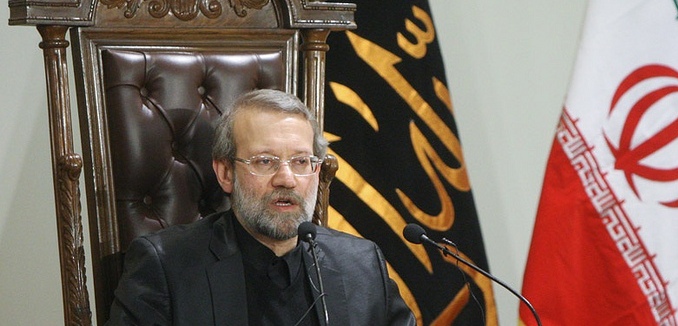America’s interpretation of the Iran nuclear deal is inaccurate, the speaker of the Iranian parliament told NPR in an interview today.
Ali Larijani says the agreement is good enough. He adds that [the] United States’ reading of that deal, particularly when it comes to sanctions, is not good at all. And he’s hoping that the agreement brings change in his country — though not as much as many Iranians would want. …
Larijani supported the negotiations that led to the agreement, which places limits on Iran’s nuclear program in exchange for the lifting of global economic sanctions. He called the final terms “acceptable.”
When asked by NPR if the United States could maintain or impose sanctions on Iran for its support of Hezbollah, as President Barack Obama and Secretary of State John Kerry have asserted, Larijani was dismissive: “There are different points mentioned in the text that need to be read carefully. The text said that no country will go after new sanctions.” Larijani also said that if Iran views the United States as having violated the deal, “we will respond accordingly.”
Paragraph 36 of the deal, formally known as the Joint Comprehensive Plan of Action (JCPOA), states that if a party to the deal feels that a proposed resolution to a dispute with other signatory nations failed to address its concerns, that party “could treat the unresolved issue as grounds to cease performing its commitments under this JCPOA in whole or in part and/or notify the UN Security Council that it believes the issue constitutes significant non-performance.” The JCPOA also allows Iran to treat any attempt to re-impose sanctions “as grounds to cease performing its commitments under this JCPOA in whole or in part.”
Larijani’s interview is just the latest example of diverging American and Iranian interpretations of the JCPOA. Frederick Kagan of the American Enterprise Institute outlined a number of these differences last week. Kagan noted that Iranian President Hassan Rouhani has claimed that since UN Security Council-mandated restrictions on Iran’s ballistic missile program are not mentioned in the JCPOA, they are not binding on Iran, and violating related UN resolutions would not constitute violating the JCPOA. Rouhani has also said that Iran will not be bound by Security Council resolutions limiting its weapons development or procurement.
Kagan observed that Iran has demanded that all sanctions be lifted, not just the ones related to Iran’s nuclear program. Salehi’s comments suggest that this is a widely held belief among Iran’s leadership.
“Only one thing is perfectly clear,” Kagan concluded: “Rouhani’s interpretation of the nuclear deal cannot be reconciled with Obama’s. That is a problem.”
[Photo: Parmida Rahimi / Flickr ]




